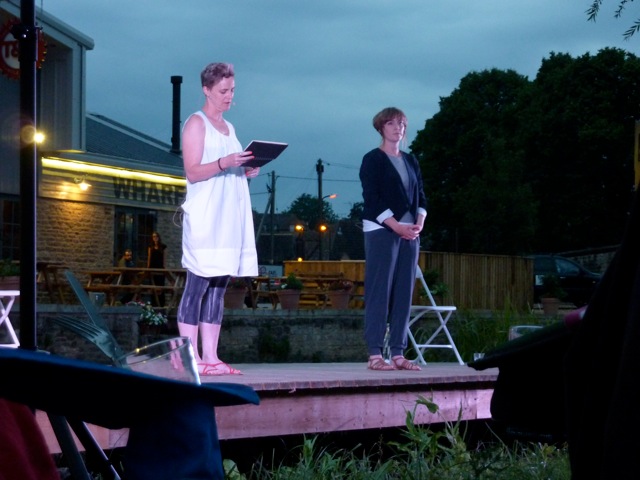Rob Gee presents Forget Me Not – The Alzheimer’s Whodunit (Upstairs at the Western, Leicester 22 May 2015)
-Reviewed by Jayne Stanton–
 THE VENUE: Upstairs at the Western is a volunteer-led venue and Leicester’s very own West End pub theatre. Off the Fence theatre company offers a wide range of quality performances in a professional auditorium at affordable prices.
THE VENUE: Upstairs at the Western is a volunteer-led venue and Leicester’s very own West End pub theatre. Off the Fence theatre company offers a wide range of quality performances in a professional auditorium at affordable prices.
THE VIBE: Theatre-goers collected their tickets at the pop-up box office situated between a singer in the main bar and groups of real ale punters spilling out into the back yards of this lively city pub. Any misgivings about the show date and timing were short-lived, though. In a well-planned hiatus between soul and high energy post-punk band performances, the theatre audience took its pick of the unreserved seating upstairs. For the next hour, we swapped worlds, seemingly isolated, like the various characters in Rob Gee’s one-man show.
REVIEWER’S DISCLOSURE: As a regular frequenter of spoken word events, I’m a self-confessed Rob Gee fan. Having seen his shows SmartArse and Fruitcake – Ten Commandments from the Psychiatric Ward back in 2010, I hoped that Forget Me Not would live up to my expectations.
Forget Me Not – The Alzheimer’s Whodunit is the second in a trilogy (and Fruitcake’s sequel) exploring mental health themes. Rob Gee certainly writes what he knows: a self-confessed ‘reformed psychiatric nurse’ with more than enough years under his uniform, he is well-qualified to interrogate his subject and offer the audience serious food for thought on how dementia patients are perceived and treated.
Forget Me Not is set on a challenging behaviour ward for dementia patients. A wooden chair (from the bar?) the only stage prop; snatches of theme-related by-gone hits (including I’m the One for You, Thanks for the Memory) between scenes. Gee’s wordsmithery, body language and impeccable sense of timing conjured a tragic-comic plot (with more twists than this rookie reviewer could handle, at times), his seamless changes between characters were aided and abetted by some very slick spotlight operation.
The opening scene features Elsie, a dementia patient ‘losing [her] memory, one story at a time.’ Gee’s adept use of verse to tragic-comic effect happily juxtaposes ‘nappy’ with ‘happy’ and gives a new meaning to ‘taking the piss.’ At this point in the proceedings, Gee affords his audience the security of a few laughs at the expense of his characters living on a diet of ‘pre-digested fisherman’s pie’ and incarcerated by ‘The Baffle Lock’ (explained and demonstrated by ward nurse Dean: cue much hilarity).
Gee’s poetry then gives way to prose, for the most part, as more characters are added to the mix and we are drawn into the world of the ward, its inmates and incumbents. Gee likens ‘getting old’ to ‘getting mugged’: ward nurse Timothy unperturbedly relates his birdwatching doings to colleague Dean whilst engaged in the never-ending round of nappy-changing. And a ‘buggered off patient’ who’s outwitted the baffle lock? ‘All in a day’s work’ on a psychiatric ward with a staff ratio of ‘one to seven and a half doubly-incontinent violent patients.’
Enter a ward manager with ‘a face like a gonad that’s just been stamped on,’ a dementia patient who dies as the result of ‘a fall,’ and her widowed husband/ex-detective inspector/recently diagnosed dementia sufferer who decides to investigate with a notebook as his aide memoir. Here, the pace quickens via a series of skilful plot developments and complications: a missing pair of earrings found during a staff locker search, an official police detective who mixes his idioms with the best (or worst-affected) of them, a dead body in the staff room with a major head trauma, a patient with a paper weight, a second body discovered in the isolation ward. The audience is masterfully misled by likely suspects, motives, red herrings and perfect alibis (‘a murder so perfect, you could even hide it from yourself,’ for starters).
With the ward in lock-down and the crime investigation well underway, Gee continues to inject humour into the rapid unravelling of events. There’s Molly repeating ‘All day…all day…’ on a loop (although she can’t remember why) and fellow patient Percy exposing himself to a burly police sergeant. The tying together of plot strands is as satisfying as it is commanding. It is a rollercoaster ride without shock-absorbers.
The show ends on a note of optimism. Dean paints the picture: Molly and new patient Horace ‘enjoying each [day] for what it is’ – ‘meeting for the first time.’ A tender if poignant moment which evoked an involuntary and clearly audible response from the audience.
This one-man show from a man in the know is so much more than the sum of its ‘granny farming’ capers of ‘feeding, toileting and random acts of violence.’ It is at least as thought-provoking (read: educational) as it is entertaining. Watch out for Icarus Dancing, the final part of Rob Gee’s trilogy, Upstairs at the Western this autumn.





